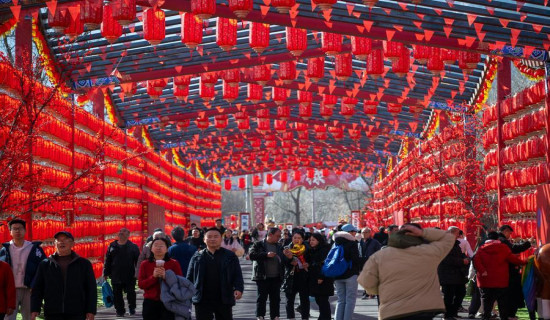- Wednesday, 4 March 2026
NC Mahasamiti Meet
Sends Tremors Among Coalition Allies
Despite being touted as ‘historic,’ Nepali Congress (NC)’s four-day Mahasamiti meeting has concluded with a bag of contradictions. Much of the energy of delegates was spent on whether or not the party should forge an alliance in the upcoming elections. This debate has overshadowed the agenda of constitution amendment, the performance of the government and reform of party organisation. Mahasamiti has endorsed the three reports presented by vice president Purna Bahadur Khadka and general secretary duo – Gagan Thapa and Bishow Prakash Sharma. Whatever have been written in their reports, the party Central Committee has wielded power to modify them to suit the interest of the establishment.
Mahasamiti meeting is supposed to concentrate on the policy and party’s statute but they did not come in priority in the conclave. Party president Sher Bahadur Deuba, in his inaugural speech, had asked the representatives to start formal debate on the amendment of constitution without affecting its form of governance and fundamental principles. Deuba was of the view that the time has come to evaluate the implementation of constitution and identify its problems, complexity and ambiguity. This is the first time that any major party leader floated the idea of amending the constitution promulgated in 2015.
Liberal approach
The NC president’s liberal approach to revisit the national charter is quite interesting in the sense that his mentor and former president Girija Prasad Koirala had always snubbed the call to revise the 1990 constitution to accommodate emerging political dynamics and widen the scope of democratic polity. Koirala and Co had claimed that it was the world’s best constitution and there was no need to change even its commas and full stops. The NC’s adamancy stagnated nation's constitutional evolution, fuelling a series of violent political campaigns and bellicose social movements that shook the nation to core. No constitution is perfect and its timely amendments help address the new political, social and economic challenges.
In Nepali context, however, the problems largely lie in the character of actors, not in the letters of the constitution. Failure to abide by spirit of the constitution has given rise to the authoritarian tendency, corruption, and instability. But NC’s gathering did not spur the systemic debates on the constitution revision. There was a signature campaign in favour of Hindu state. More than one thousand representatives backed this campaign that seeks to declare Nepal a Hindu state. To counter it, a group of indigenous nationalities submitted a memorandum, demanding that Mahasamiti must not take a decision to reverse secularism. There was no clarity as to which provisions of the constitution the NC wants to amend.
The Mahasamiti jamboree turned out to be a showdown between the establishment and rival factions. The establishment under Deuba was aware that the national meet did not make any move against the current coalition government. But its relentless efforts to convince general secretary Thapa to remove a statement that the NC would contest next election without forging alliance with other parties from his report went down the tubes. With Mahasamiti already approving his report, the establishment is now fretting over to dilute its impact on the unity of coalition partners. No sooner had Thapa distributed his report to the delegates in the meeting hall, than Deuba rushed to Baluwatar to assure Prime Minister Pushpa Kamal Dahal Prachanda that his party would not deviate from the current alliance.
Deuba has managed to issue a statement from Mahasamiti in favour of the coalition government. The 11-point decisions, issued after the conclusion of Mahasamiti meeting, stated that the NC would stick to the alliance. “As a main constituent of the alliance, the NC has the responsibility to extend continuous support to the coalition government to achieve good governance, development and prosperity,” said Deuba in the closing session of the gathering. The meeting between Prime Minister Prachanda and CPN-UML chair KP Sharma Oli held in the wake of Mahasamiti meeting also gave a shudder to the NC establishment. Thapa’s anti-alliance rhetoric is likely to alienate the CPN-Maoist Centre and other allies, dampening Deuba's prospect to be the prime minister for the sixth time.
Thapa's proposal to fight upcoming general polls solo also carries a hidden strategy to weaken the establishment in the forthcoming party convention. As the representatives divided over this issue, they failed to deliberate on his 20-point organisation reform action plan that includes leadership selection system and candidates selection method (primary election). Likewise, another general secretary Sharma has unveiled exit policy in which he has fixed term for an individual who assumes the post of president, prime minister, minister and lawmaker. He has set one term for the president, two for the prime minister, three for the minister and four for the lawmaker.
Positive implications
If implemented, Sharma's proposal will have positive implications for institutionalising democracy. This will enable to boost new leadership and bridge the inter-generational gap affecting all parties as well as the nation for decades. The old guards are holding the top posts in parties and governments, refusing to give a fair crack of the whip to the new generation. However, Sharma's proposition is unlikely to get the nod from the central committee because it will deprive Deuba from becoming the next PM and Thapa from lawmaker.
Political observers think that the Mahasamiti could not take vocal decisions on controlling corruption and making effective service delivery to the public. The NC has held important portfolios in the federal government and leads many provinces and local bodies. The Mahasamiti could give strong guidance to the key post holders so that they perform better. Nonetheless, The Mahasamiti has brought together party functionaries from across the country to exercise inner-party democracy. If the leadership pays heed to their valuable suggestions, this will reenergise the old democratic party that is facing an enduring threat from divided yet outnumbered communist groups.
(The author is Deputy Executive editor of this daily.)















